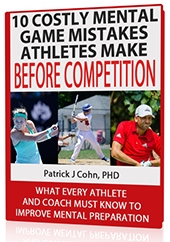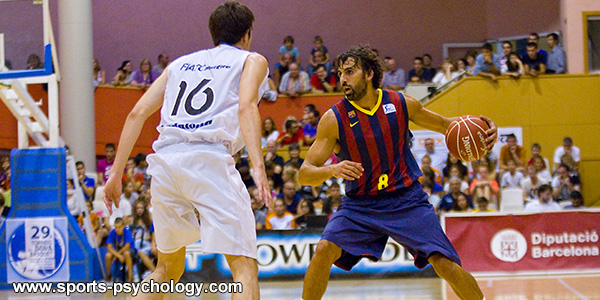How to Be Clutch Like Portland’s Damian Lillard
Summary: Being clutch in sports means performing under pressure without fear of the outcome. Many athletes struggle in high-pressure moments because they worry about results, which increases nerves and hurts performance. Calm athletes who focus on the process rather than the outcome are more likely to succeed.
Performing under pressure… Being clutch… Making the big play… Hitting the winning shot…
This is what makes sports exciting for athletes.
When athletes are young and they are playing in their backyards, they dream up scenarios where their last ditch heroic efforts turn the tide and win the game in dramatic fashion.
Yet, when athletes become older, fear sets in and they don’t to take on that role of taking that clutch shot.
Some athletes get swallowed up by the moment and falter under the competitive pressure.
What Makes an Athlete Clutch?
What are the characteristics that separate those athletes who want the game in their hands in the closing moments and those athletes who want to defer to other athletes towards the end of a game?
First of all, being clutch doesn’t mean always making the final shot to win the game or hitting the landing perfectly or striking out the side in the ninth inning.
Being clutch is not backing down from the inevitable pressure that surrounds an athlete when the game is on the line.
Being clutch is feeling the pressure and performing anyway regardless of the possible result.
Being clutch is feeling intensity, but not nerves and the ability to focus and perform up to your ability no matter the game situation.
To better understand the mindset of being clutch, let’s examine the mindset of NBA Portland Trail Blazers All-Star Damian Lillard.
Lillard has averaged 23.1 points per game during his six-year career and roughly 27 points per game in the last two seasons.
Last season, Lillard was named as the most clutch player, receiving the National Basketball Player Association Mr. Clutch award nominated from his fellow players.
In 151 clutch minutes (less than five minutes remaining in the 4th quarter or overtime and neither team ahead by more than five points) Lillard has scored 127 points.
Lillard reflected on what has helped him perform in clutch moments and he pointed to an incident when he was younger that helped cope with the sense of pressure to perform in closing minutes of a game.
LILLARD: “I remember in the eighth grade I had a game winning shot. I think we were down by two. I hit a three-pointer with one second left and I took my jersey off and started celebrating. It was one second left and I got a tech and the other team got two free throws. We ended up losing the game by one and that was the worst thing that could ever happen.”
To put it another way, a loss is the worst that could happen and nothing more.
LILLARD: “I’ve had a lot of moments where something just didn’t go my way at the time that I needed it to in a game. It just made me not fear what the outcome would be… I think it just made me more calm in those situations and it’s just going to be what it’s going to be.”
What Helps an Athlete Perform Best in the Clutch?
Being more calm.
What helps an athlete to stay calm?
Not worrying about results.
Being calm frees you up to play and to focus like you normally would which increases your ability to perform your best despite the circumstances.
The truth is, you can be clutch if you can let go of what could happen and just play the game with trust in your skills.
How to Perform in Clutch Moments:
First, you need to realize sports are not life-or-death. It’s just a game.
Second, don’t define the moment as clutch and attach significance to the outcome.
Next, you need to know that being clutch doesn’t mean hitting the mark every time but making the attempt to hit the mark.
Fostering a “clutch” mindset is a matter of staying grounded in the moment, minimizing the “fear,” and managing expectations.
Your Mentally Around Clutching
1. Focus on the Process, Not the Outcome
You perform better in clutch moments when you let go of results. Worrying about what might happen increases pressure and reduces focus. Trust your training and stay locked into the task at hand.
2. Stay Calm Under Pressure
Calm athletes make better decisions in the final moments of a game. Remind yourself that sports are not life-or-death. This perspective lowers nerves and helps you play with freedom.
3. Redefine What It Means to Be Clutch
Being clutch is not about always hitting the winning shot. It is about not backing down from pressure and taking the chance when the game is on the line. Shifting this mindset helps you embrace the moment instead of fearing it.
Related Sports Psychology Articles:
- Mental Toughness for Sports: Grinding it Out
- How to Avoid The Need For Social Approval
- Focusing on The Present Rather Than Past Mistakes
Free Mental Toughness Reports

Get instant access to a mental game report to improve your mental toughness. Are you making one or more of these “deadly” mental game mistakes prior to competition? You can improve your mental game with one of our free sports-specific reports below.
with our free mental toughness reports, you’ll:
- Discover if you have positive or negative pregame jitters.
- Identify your pre-competition mental game mistakes.
- Learn the important pregame mental skills to boost your performance and success!
Learn how mental game strategies can boost your mental toughness in sports with Dr. Cohn’s free mental game reports!
FAQ: Performing in Clutch Moments
Q: What does it mean to be clutch in sports?
A: Being clutch means staying calm under pressure, focusing on the moment, and performing without fear of the outcome.
Q: How can athletes stay calm in high-pressure moments?
A: Athletes stay calm by keeping perspective, reminding themselves that it is just a game, and focusing on their skills rather than results.
Q: Does being clutch mean always making the winning play?
A: No, being clutch means not backing down from pressure. It is about taking the shot or making the play, not guaranteeing success.
Q: Why do some athletes struggle in clutch situations?
A: Some athletes focus too much on results, which increases nerves and fear of failure. This prevents them from playing freely.
Q: How can athletes develop a clutch mindset?
A: Athletes can develop a clutch mindset by practicing calmness, letting go of fear, and treating clutch moments like any other play.
Dr. Patrick Cohn is an expert mental performance coach who has helped athletes for over 30 years enhance their performance. Dr. Cohn earned a master’s degree in sports psychology from CSUF and a Ph.D. from the University of Virginia, specializing in Applied Sports Psychology.

